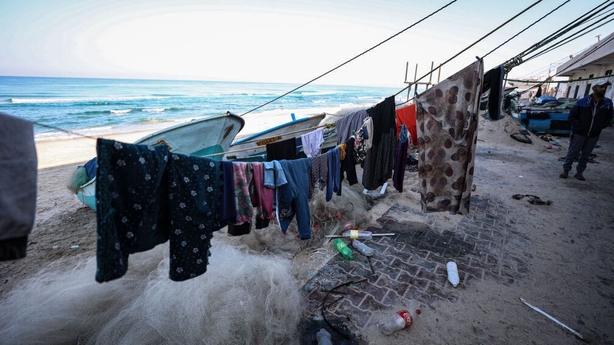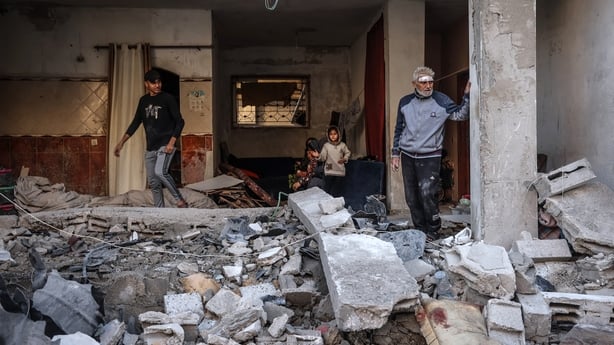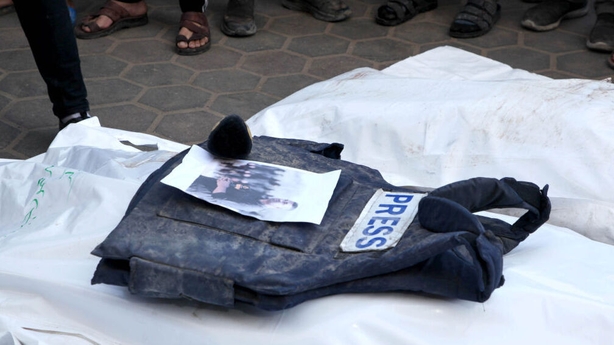Israeli Prime Minister Benjamin Netanyahu has said that Israel's war against Hamas will last "many months" as he renewed his pledge to eliminate the Palestinian militant group from Gaza.
Vowing to bring home all Israelis still held hostage in Gaza, Mr Netanyahu said the military was involved in a "complex fight" and needed time to achieve its goals.
"The war will continue for many months until Hamas is eliminated and the hostages are returned," he told a news conference.
"We will guarantee that Gaza will no longer pose a threat to Israel," he said, adding that around 8,000 militants had already been killed in Israel's military campaign in the Palestinian territory.
"Step by step we are depriving Hamas of their capabilities... We will also eliminate the leaders."

The war between Israel and Hamas erupted after Hamas fighters carried out a deadly attack on southern Israel on 7 October that killed about 1,140 people, according to an AFP tally based on Israeli figures.
International mediators, who last month brokered a week-long truce that saw more than 100 hostages released and some aid enter Gaza, continue in their efforts to secure a new pause in fighting.
US news outlet Axios and Israeli website Ynet, both citing unnamed Israeli officials, reported that Qatari mediators had told Israel that Hamas was prepared to resume talks on new hostage releases in exchange for a ceasefire.
When asked if a new deal for hostage releases was being negotiated, Netanyahu said Hamas had been "giving all kinds of ultimatums that we didn't accept".
"We are seeing a certain shift (but) I don't want to create an expectation," he said without elaborating.
A Hamas delegation was in Cairo yesterday to discuss an Egyptian plan for renewable ceasefires, a staggered release of hostages for Palestinian prisoners and ultimately an end to the war, sources close to Hamas said.
Palestinian militants abducted some 250 hostages during the 7 October attack. Some 129 hostages are still held in Gaza, according to the Israeli military.
Today, hundreds of demonstrators rallied in Tel Aviv, demanding that the government secure their release.
"Bring them home now," the demonstrators chanted, an AFP correspondent reported.
"The scariest thing in Gaza was to be forgotten," said Moran Stela Yanai, one of the hostages released during last month's truce.
"The most humane thing that can be done... is to bring everyone back," she told the rally.
Israel's relentless assault on Gaza in retaliation to the 7 October attack has so far killed at least 21,672 people, most of them women and children, according to the health ministry in Hamas-run Gaza.
Israel pushes deeper into Gaza camps
Israeli tanks pushed deeper into central and southern Gaza under heavy air and artillery fire, residents said, pressing a deadly offensive that has razed much of the enclave and that Israel has said may last months more.
Fighting was focused in al-Bureij, Nuseirat, Maghazi and Khan Younis, backed by intensive air strikes that filled hospitals with injured Palestinians.
The bombardment has killed 165 people and wounded 250 others in Gaza over the past 24 hours, health authorities in the Hamas-run territory said.
At Nasser Hospital in Khan Younis, the biggest and most important medical facility in the south of the tiny, crowded territory, a Red Crescent video showed paramedics rushing a tiny, dust-covered baby into a busy hospital as one shouted "there is breathing, there is breathing".
Further south, the border city of Rafah near Egypt was teeming with Gazans seeking safety from Israel's relentless bombardment in its fight against Palestinian militants.
"Enough with this war! We are totally exhausted," said Umm Louay Abu Khater, a 49-year-old woman who had fled her home in Khan Yunis, taking refuge in Rafah.
"We are constantly displaced from one place to another in cold weather," she said. "The bombs keep falling on us day and night."
The Israeli army kept up its campaign in the face of mounting international pushback, reporting "fierce battles" and air strikes across the narrow Palestinian territory.
In Beit Lahia in north Gaza, "two Hamas military compounds were dismantled by the troops," a military statement today said, and dozens of "terrorists" were killed in Gaza City.
As 2023 draws to a close, Ahmed al-Baz, a 33-year-old Palestinian displaced from Gaza City, said this year had been "the worst in my life".
"It was a year of destruction and devastation," he said in Rafah, surrounded by tents in a makeshift camp.
"We just want the war to end, and start the new year at home, with a ceasefire declared."
Fierce Israeli tank fire and aerial bombing struck Khan Younis in Gaza last night after nearly 200 people were reported killed in 24 hours in Israel's campaign against Hamas militants.
Planes also carried out a series of air strikes on the Nuseirat camp in central Gaza, according to medics and Palestinian journalists.
Israeli forces have been pounding Khan Younis in preparation for an anticipated further advance into the main southern city, swathes of which they captured in early December.
Israeli Defense Minister Yoav Gallant said troops were reaching Hamas command centres and arms depots.
The Israeli military said it had destroyed a tunnel complex in the basement of one of the houses of the Hamas leader for Gaza, Yahya Sinwar, in Gaza City.
Nearly all of Gaza's 2.3 million people have fled their homes at least once and many are on the move again, often reduced to taking shelter in makeshift tents or huddled under tarpaulins and plastic sheets on open ground.
The narrow coastal strip is just 40km long, making it one of the most densely populated areas in the world.

Palestinian journalist killed
A Palestinian journalist working for Al-Quds TV was killed along with a number of his family members in an Israeli airstrike on their house in the Nuseirat camp in central Gaza, health officials and fellow journalists said.
It brings the toll of Palestinian journalists killed in the Israeli offensive to 106, according to Gaza's government media office.
The Committee to Protect Journalists (CPJ) said last week that the first 10 weeks of the Israel-Gaza war were the deadliest recorded for journalists, with the most journalists killed in a single year in one location.
Israel has previously said it has never and will never deliberately target journalists and that it is doing what it can to avoid civilian casualties, but the high death toll has caused concern even amongst its staunchest allies.

The US has called for it to scale down the war in coming weeks and move to targeted operations against Hamas leaders. So far Israel shows no sign of doing so.
The US has called for Israel to scale down the war in coming weeks and move to targeted operations against Hamas leaders, although so far it shows no sign of doing so.
South Africa asked the International Court of Justice (ICJ) yesterday for an urgent order declaring that Israel was in breach of its obligations under the 1948 Genocide Convention in its crackdown against Hamas in Gaza.
It called on the court to issue short-term measures ordering Israel to stop its military campaign "to protect against further, severe and irreparable harm to the rights of the Palestinian people."
No date has been set for a hearing.
In a response, Israel's foreign ministry blamed Hamas for the suffering of Palestinians in Gaza by using them as human shields and stealing humanitarian aid from them. Hamas denies such accusations.
Israel helps deliver vaccines to Gaza
Israel said yesterday that it facilitated the entry of 49,130 vaccine doses, enough to inoculate almost 1.4 million people against illnesses including polio, tuberculosis, hepatitis, diphtheria, tetanus, whooping cough and meningitis.
The vaccine transfer which was coordinated with UNICEF, a statement from COGAT (an agency of the Israeli defence ministry that coordinates with the Palestinians) claimed the vaccine was organised in order to prevent the spread of disease in the enclave.
Gaza is almost entirely reliant on food, fuel and medical supplies from the outside, and Israel has limited access apart from at the southern end. International agencies say supplies being let in through Israeli inspections are a small fraction of Gaza's vast needs.
Last week Israel bowed to international pressure to open a second crossing it said would double the number of supply trucks daily to 200, but just 76 were able to enter on Thursday, according to the United Nations, compared to 500 in peacetime.
An Israeli government spokesman said it does not limit humanitarian aid and the problem was with its distribution inside Gaza.
